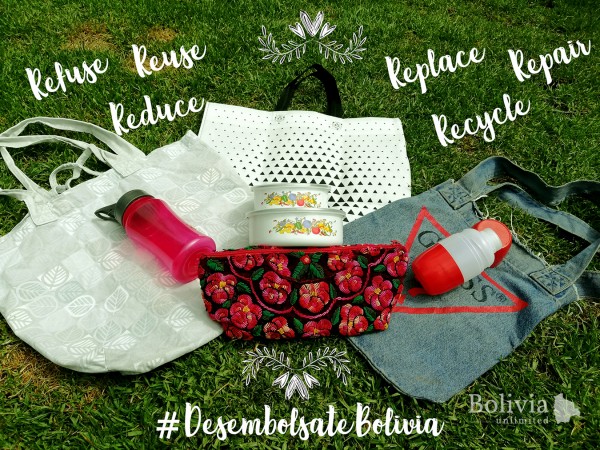Less plastic, please!

29 Oct, 2019 | Renata Lazcano Silva
Social issues, Lifestyle and Urban living
Photo: Renata Lazcano Silva
Aiming to reduce single-use plastics
The plastic bag is ubiquitous in Bolivia and around the world. On average, a plastic bag is used once for no more than 15 minutes before it is thrown away. It then takes at least 150 to 500 years (or more) for that bag to degrade. The United Nations estimates that 10 million plastic bags are used globally every minute. In Bolivia, about 4 billion plastic bags are used each year, without considering other types of single-use plastics. So what are we doing about it?
The Union of Environmental Journalists of Bolivia (Unión de Periodistas Ambientales de Bolivia, or UPAB), a civil association founded in December 2008, has sponsored a bill to reduce and replace plastic bags. The bill’s objective is to ‘minimise the impact on the environment and ensure the sustainability of the life systems of Mother Earth through the gradual and progressive reduction and replacement of the use and production of plastic bags throughout the national territory.’ This bill, which was approved by the Bolivian Senate’s Environmental Commission in May 2019, was a collaborative effort that enlisted the input of government ministries, business leaders and other organisations to avoid any obstacles in its implementation after being turned into law.
While waiting for the full legislature to vote on the bill, an environmental education campaign, #DesembolsateBolivia (#UnbagBolivia), is rolling out across the country to unite schools, universities, businesses, markets, neighbourhoods and other entities under the common objective of raising public awareness about the impact of the use of single-use plastic bags, reducing their use and proposing ecological alternatives to plastic. Education is essential to motivate people to change their habits for more sustainable practices. The campaign has the support of the Bolivian Ministry of Education to involve the country’s education system. Furthermore, mass media and social networks are helping this initiative reach the public at large.
‘It is important that the country assumes clear environmental strategies,’ Carlos Lara, the president of the UPAB, says. ‘It has to prioritise the issue of the environment now and in the following years, because the environment is very sick and in serious danger.’ All the nations of this earth have to apply policies and regulations to protect the environment and protect their inhabitants, but we here in Bolivia must make our own first steps, change our habits and show by example the message of nature conservation to more people. Let's make a difference, day by day, decision after decision. Our planet is the only home we have. We are now facing the extremely serious global problems of pollution, deforestation and loss of biodiversity, among others. The good news is that we know what needs to be done. Now is the time to act.







